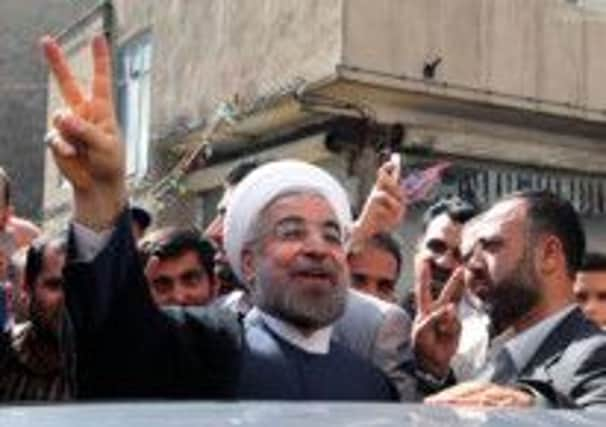Iran: Hassan Rouhani wins presidential election


Najjar said 72 per cent of the 50 million eligible Iranians had turned out to vote, and that Rouhani had secured just over the 50 per cent of the vote needed to avoid a run-off.
Rouhani took a solid lead over conservative rivals in preliminary vote counting in Iran’s presidential election, making him the early frontrunner over favoured hard-
liners.
Advertisement
Hide AdAdvertisement
Hide AdThe outcome is unlikely to transform relations between Iran and the outside world, the Islamic Republic’s disputed policy on developing nuclear power or its support of Syria’s president in the civil war there – all sensitive security matters that are the domain ofsupreme leader Ayatollah Ali Khamenei.
However, the president does wield important influence in decision-making in the sprawling Shi’ite Muslim nation and major Opec state of 75 million and could bring a change from the confrontational style of president Mahmoud Ahmadinejad, who was constitutionally barred from seeking a third consecutive term.
Rouhani’s wide early margin revealed a major reservoir of pro-reform sentiment whereby many voters seized a chance to repudiate the dominant hardline elite over Iran’s economic woes, international isolation and crackdowns on personal freedoms despite restrictions on candidate choice and campaigning.
During the run-up to the election, Rouhani, a moderate who has a doctorate from Glasgow Caledonian University and is a former chief nuclear negotiator known for his conciliatory approach, signalled he will promote a foreign policy based on “constructive interaction with the world” and enact a “civil rights charter” at home.
In an apparent attempt to convey political continuity to both domestic opponents and western adversaries, Khamenei said that whatever the result of election, it would be a vote of confidence in the 34-year-old Islamic Republic. By the time around 23 million votes had been counted from the 50-million-strong electorate, Rouhani had tallied 51.07 per cent of all ballots cast, Iran’s interior minister said. It was enough to avoid a second-round run-off on 21 June.
Rouhani’s nearest rival was conservative Tehran mayor Mohammad Baqer Qalibaf, lagging a long way behind with 16.3 per cent.
Other hardline candidates close to Khamenei, including current nuclear negotiator Saeed Jalili, scored even lower.
Former British foreign secretary Jack Straw, who dealt with Rouhani during nuclear negotiations between 2003 and 2005, called him a “very experienced diplomat and
politician”.
Advertisement
Hide AdAdvertisement
Hide Ad“This is a remarkable and welcome result so far, and I’m keeping my fingers crossed that there will be no jiggery-pokery with the final result,” Straw told Reuters, alluding to accusations of widespread rigging in the 2009 election.
“What this huge vote of confidence in Dr Rouhani
appears to show is a hunger by the Iranian people to break away from the arid and self-defeating approach of the past and for more constructive relations with the West,” he said.
“On a personal level, I found him warm and engaging. He is a strong Iranian patriot and he was tough, but fair to deal with and always on top of his brief.”
Suzanne Maloney, senior fellow at the Brookings Institution, a Washington DC-based non-profit public policy organisation, said Iran “appears to be on the verge of shocking the world”.
“With Rouhani leading the vote, the regime’s calculation now is whether a run-off campaign ... is worth the risk. A second round would entail an additional week of the kind of exhilarated campaigning, replete with young Iranians dancing in the streets and an amplified chorus of demands for social and political reforms, and ultimately pose a greater risk to the system.”
Excitement was rippling through Rouhani’s campaign headquarters, with workers there preparing for victory ahead of the final result, said a source close to the campaign.
Electoral officials did not say from which districts the votes so far counted had come from. Late last week, authorities estimated turnout would top 70 per cent – relatively high and likely to benefit Rouhani.
Rouhani’s campaign was endorsed by centrist former president Akbar Hashemi Rafsanjani after the latter, a veteran rival of Khamenei, was barred from running by a state
vetting body.
Advertisement
Hide AdAdvertisement
Hide Ad“Iran has held the most democratic elections in the world and there are no uncertainties about it,” Rafsanjani was quoted by the state-run Fars agency as saying.
Rouhani received another big lift when reformists led by ex-president Mohammad Khatami swung behind him after their own lacklustre candidate Mohammad Reza Aref withdrew in his favour.
In contrast, several high-profile conservatives with close ties to the ruling clerical or Revolutionary Guards elite failed to unite behind a single candidate, suffering what appeared to be a decisive split in their support base as a result.
Voting was extended by several hours at polling stations across the country on Friday as millions turned out to cast their ballot in the first presidential race since the 2009 contest where allegations of fraud led to mass unrest.
Rohuani came to prominence as Iran’s nuclear negotiator in talks with Britain, France and Germany between 2003 and 2005 that Tehran Iran agree to suspend uranium enrichment-related activities, easing Western pressure on Iran. He left the post when Ahmadinejad came to office in 2005.